EFB201 Essay: Market Efficiency and Fund Management
VerifiedAdded on 2022/11/18
|9
|2726
|59
Essay
AI Summary
This essay critically examines the efficient market hypothesis (EMH) and behavioral finance, analyzing their contrasting perspectives on financial markets. The essay delves into the core principles of market efficiency, exploring its different forms (weak, semi-strong, and strong) and the implications for investors. It discusses the contributions of Eugene Fama to EMH and its impact on modern finance. The essay also explores behavioral finance, which challenges the assumption of rational investors, examining the psychological factors influencing investment decisions, and the work of Richard Thaler. The analysis includes a discussion of active versus passive fund management, providing real-world examples and scholarly research to support the arguments. The essay then concludes by evaluating the validity of market efficiency and providing recommendations for a passively managed equity fund considering a switch to active management, considering the implications of both theories and the potential impact on the fund's future direction. The essay uses information from the assignment brief, including the need for referencing and the specified word count. The essay aims to provide a clear and concise overview of the financial market and its implications for the fund.
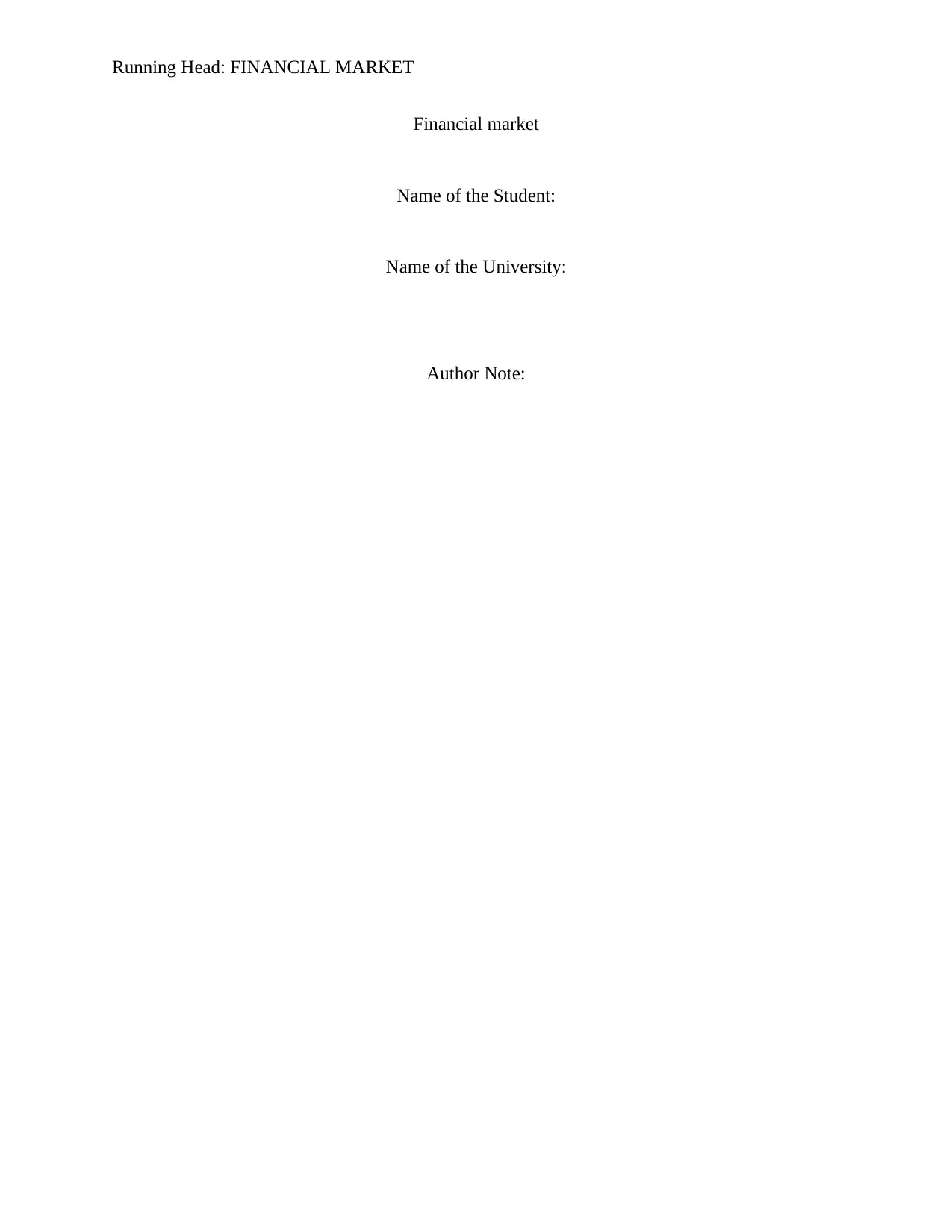
Running Head: FINANCIAL MARKET
Financial market
Name of the Student:
Name of the University:
Author Note:
Financial market
Name of the Student:
Name of the University:
Author Note:
Paraphrase This Document
Need a fresh take? Get an instant paraphrase of this document with our AI Paraphraser
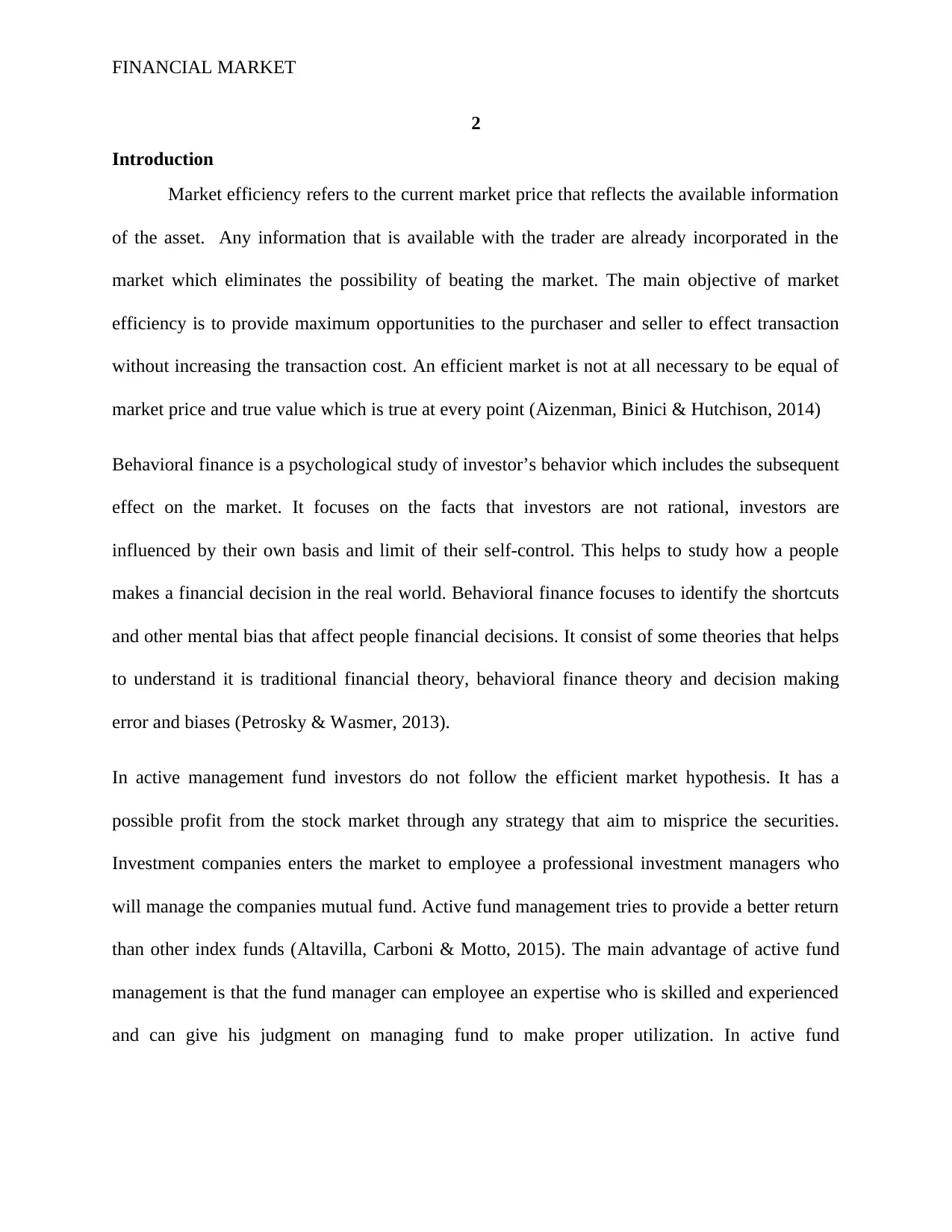
FINANCIAL MARKET
2
Introduction
Market efficiency refers to the current market price that reflects the available information
of the asset. Any information that is available with the trader are already incorporated in the
market which eliminates the possibility of beating the market. The main objective of market
efficiency is to provide maximum opportunities to the purchaser and seller to effect transaction
without increasing the transaction cost. An efficient market is not at all necessary to be equal of
market price and true value which is true at every point (Aizenman, Binici & Hutchison, 2014)
Behavioral finance is a psychological study of investor’s behavior which includes the subsequent
effect on the market. It focuses on the facts that investors are not rational, investors are
influenced by their own basis and limit of their self-control. This helps to study how a people
makes a financial decision in the real world. Behavioral finance focuses to identify the shortcuts
and other mental bias that affect people financial decisions. It consist of some theories that helps
to understand it is traditional financial theory, behavioral finance theory and decision making
error and biases (Petrosky & Wasmer, 2013).
In active management fund investors do not follow the efficient market hypothesis. It has a
possible profit from the stock market through any strategy that aim to misprice the securities.
Investment companies enters the market to employee a professional investment managers who
will manage the companies mutual fund. Active fund management tries to provide a better return
than other index funds (Altavilla, Carboni & Motto, 2015). The main advantage of active fund
management is that the fund manager can employee an expertise who is skilled and experienced
and can give his judgment on managing fund to make proper utilization. In active fund
2
Introduction
Market efficiency refers to the current market price that reflects the available information
of the asset. Any information that is available with the trader are already incorporated in the
market which eliminates the possibility of beating the market. The main objective of market
efficiency is to provide maximum opportunities to the purchaser and seller to effect transaction
without increasing the transaction cost. An efficient market is not at all necessary to be equal of
market price and true value which is true at every point (Aizenman, Binici & Hutchison, 2014)
Behavioral finance is a psychological study of investor’s behavior which includes the subsequent
effect on the market. It focuses on the facts that investors are not rational, investors are
influenced by their own basis and limit of their self-control. This helps to study how a people
makes a financial decision in the real world. Behavioral finance focuses to identify the shortcuts
and other mental bias that affect people financial decisions. It consist of some theories that helps
to understand it is traditional financial theory, behavioral finance theory and decision making
error and biases (Petrosky & Wasmer, 2013).
In active management fund investors do not follow the efficient market hypothesis. It has a
possible profit from the stock market through any strategy that aim to misprice the securities.
Investment companies enters the market to employee a professional investment managers who
will manage the companies mutual fund. Active fund management tries to provide a better return
than other index funds (Altavilla, Carboni & Motto, 2015). The main advantage of active fund
management is that the fund manager can employee an expertise who is skilled and experienced
and can give his judgment on managing fund to make proper utilization. In active fund
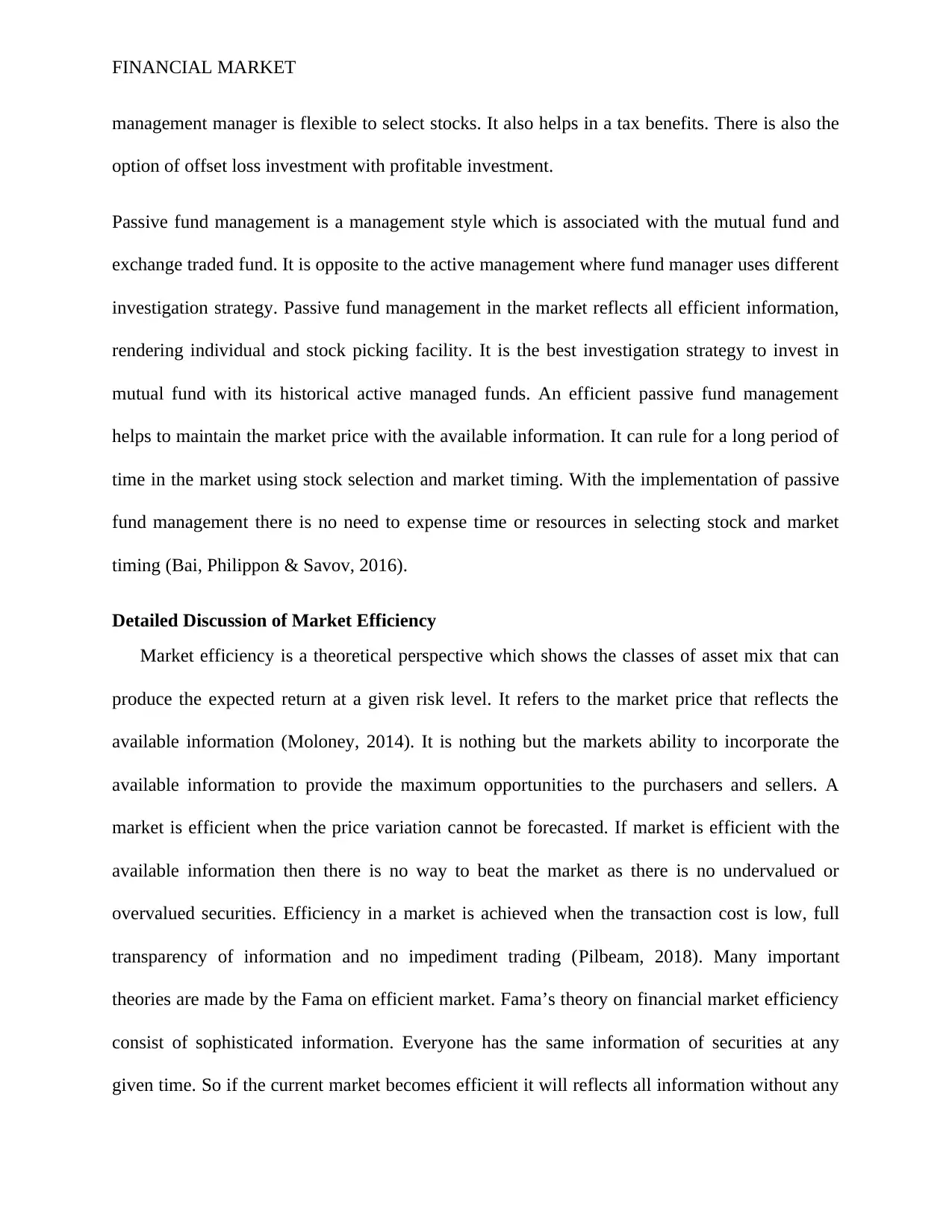
FINANCIAL MARKET
management manager is flexible to select stocks. It also helps in a tax benefits. There is also the
option of offset loss investment with profitable investment.
Passive fund management is a management style which is associated with the mutual fund and
exchange traded fund. It is opposite to the active management where fund manager uses different
investigation strategy. Passive fund management in the market reflects all efficient information,
rendering individual and stock picking facility. It is the best investigation strategy to invest in
mutual fund with its historical active managed funds. An efficient passive fund management
helps to maintain the market price with the available information. It can rule for a long period of
time in the market using stock selection and market timing. With the implementation of passive
fund management there is no need to expense time or resources in selecting stock and market
timing (Bai, Philippon & Savov, 2016).
Detailed Discussion of Market Efficiency
Market efficiency is a theoretical perspective which shows the classes of asset mix that can
produce the expected return at a given risk level. It refers to the market price that reflects the
available information (Moloney, 2014). It is nothing but the markets ability to incorporate the
available information to provide the maximum opportunities to the purchasers and sellers. A
market is efficient when the price variation cannot be forecasted. If market is efficient with the
available information then there is no way to beat the market as there is no undervalued or
overvalued securities. Efficiency in a market is achieved when the transaction cost is low, full
transparency of information and no impediment trading (Pilbeam, 2018). Many important
theories are made by the Fama on efficient market. Fama’s theory on financial market efficiency
consist of sophisticated information. Everyone has the same information of securities at any
given time. So if the current market becomes efficient it will reflects all information without any
management manager is flexible to select stocks. It also helps in a tax benefits. There is also the
option of offset loss investment with profitable investment.
Passive fund management is a management style which is associated with the mutual fund and
exchange traded fund. It is opposite to the active management where fund manager uses different
investigation strategy. Passive fund management in the market reflects all efficient information,
rendering individual and stock picking facility. It is the best investigation strategy to invest in
mutual fund with its historical active managed funds. An efficient passive fund management
helps to maintain the market price with the available information. It can rule for a long period of
time in the market using stock selection and market timing. With the implementation of passive
fund management there is no need to expense time or resources in selecting stock and market
timing (Bai, Philippon & Savov, 2016).
Detailed Discussion of Market Efficiency
Market efficiency is a theoretical perspective which shows the classes of asset mix that can
produce the expected return at a given risk level. It refers to the market price that reflects the
available information (Moloney, 2014). It is nothing but the markets ability to incorporate the
available information to provide the maximum opportunities to the purchasers and sellers. A
market is efficient when the price variation cannot be forecasted. If market is efficient with the
available information then there is no way to beat the market as there is no undervalued or
overvalued securities. Efficiency in a market is achieved when the transaction cost is low, full
transparency of information and no impediment trading (Pilbeam, 2018). Many important
theories are made by the Fama on efficient market. Fama’s theory on financial market efficiency
consist of sophisticated information. Everyone has the same information of securities at any
given time. So if the current market becomes efficient it will reflects all information without any
⊘ This is a preview!⊘
Do you want full access?
Subscribe today to unlock all pages.

Trusted by 1+ million students worldwide
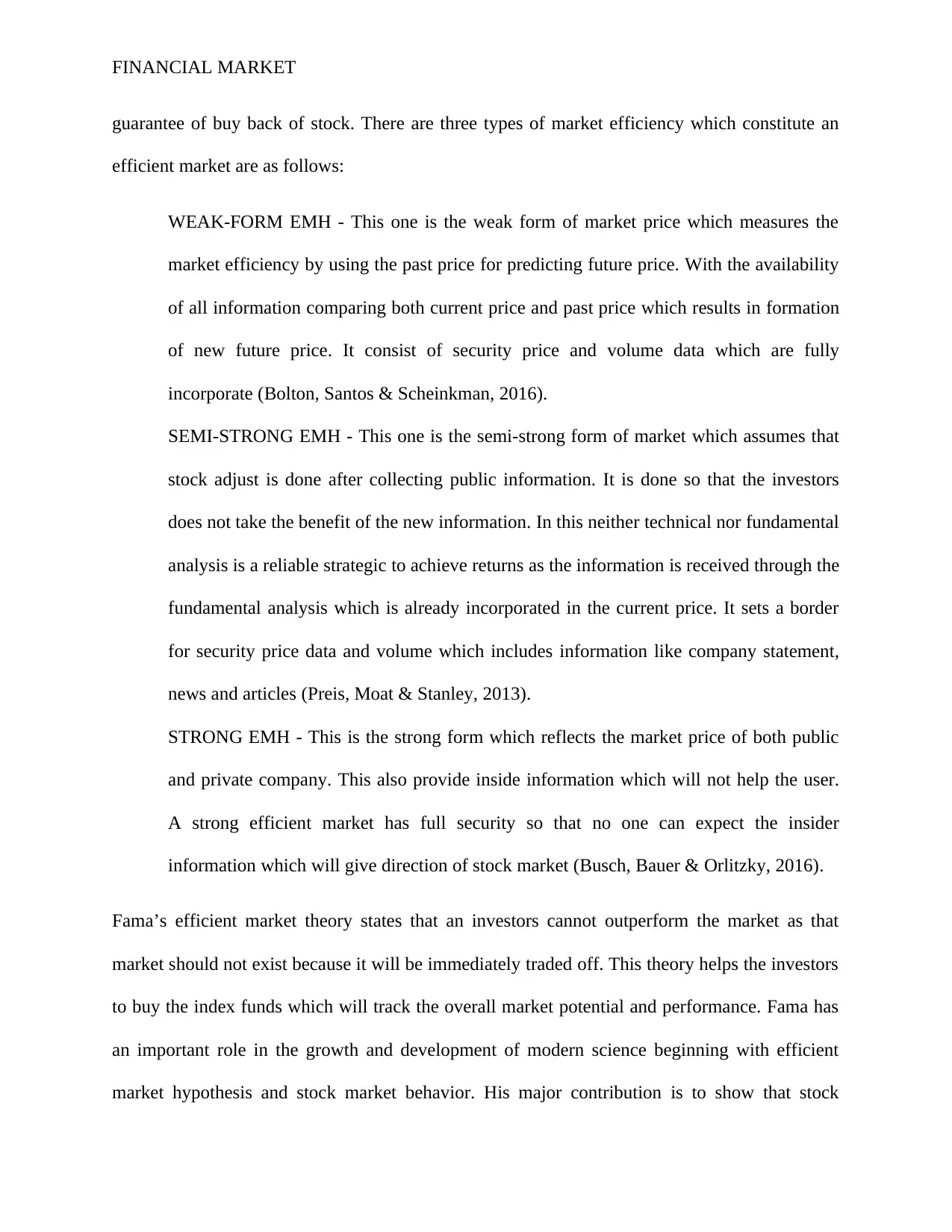
FINANCIAL MARKET
guarantee of buy back of stock. There are three types of market efficiency which constitute an
efficient market are as follows:
WEAK-FORM EMH - This one is the weak form of market price which measures the
market efficiency by using the past price for predicting future price. With the availability
of all information comparing both current price and past price which results in formation
of new future price. It consist of security price and volume data which are fully
incorporate (Bolton, Santos & Scheinkman, 2016).
SEMI-STRONG EMH - This one is the semi-strong form of market which assumes that
stock adjust is done after collecting public information. It is done so that the investors
does not take the benefit of the new information. In this neither technical nor fundamental
analysis is a reliable strategic to achieve returns as the information is received through the
fundamental analysis which is already incorporated in the current price. It sets a border
for security price data and volume which includes information like company statement,
news and articles (Preis, Moat & Stanley, 2013).
STRONG EMH - This is the strong form which reflects the market price of both public
and private company. This also provide inside information which will not help the user.
A strong efficient market has full security so that no one can expect the insider
information which will give direction of stock market (Busch, Bauer & Orlitzky, 2016).
Fama’s efficient market theory states that an investors cannot outperform the market as that
market should not exist because it will be immediately traded off. This theory helps the investors
to buy the index funds which will track the overall market potential and performance. Fama has
an important role in the growth and development of modern science beginning with efficient
market hypothesis and stock market behavior. His major contribution is to show that stock
guarantee of buy back of stock. There are three types of market efficiency which constitute an
efficient market are as follows:
WEAK-FORM EMH - This one is the weak form of market price which measures the
market efficiency by using the past price for predicting future price. With the availability
of all information comparing both current price and past price which results in formation
of new future price. It consist of security price and volume data which are fully
incorporate (Bolton, Santos & Scheinkman, 2016).
SEMI-STRONG EMH - This one is the semi-strong form of market which assumes that
stock adjust is done after collecting public information. It is done so that the investors
does not take the benefit of the new information. In this neither technical nor fundamental
analysis is a reliable strategic to achieve returns as the information is received through the
fundamental analysis which is already incorporated in the current price. It sets a border
for security price data and volume which includes information like company statement,
news and articles (Preis, Moat & Stanley, 2013).
STRONG EMH - This is the strong form which reflects the market price of both public
and private company. This also provide inside information which will not help the user.
A strong efficient market has full security so that no one can expect the insider
information which will give direction of stock market (Busch, Bauer & Orlitzky, 2016).
Fama’s efficient market theory states that an investors cannot outperform the market as that
market should not exist because it will be immediately traded off. This theory helps the investors
to buy the index funds which will track the overall market potential and performance. Fama has
an important role in the growth and development of modern science beginning with efficient
market hypothesis and stock market behavior. His major contribution is to show that stock
Paraphrase This Document
Need a fresh take? Get an instant paraphrase of this document with our AI Paraphraser
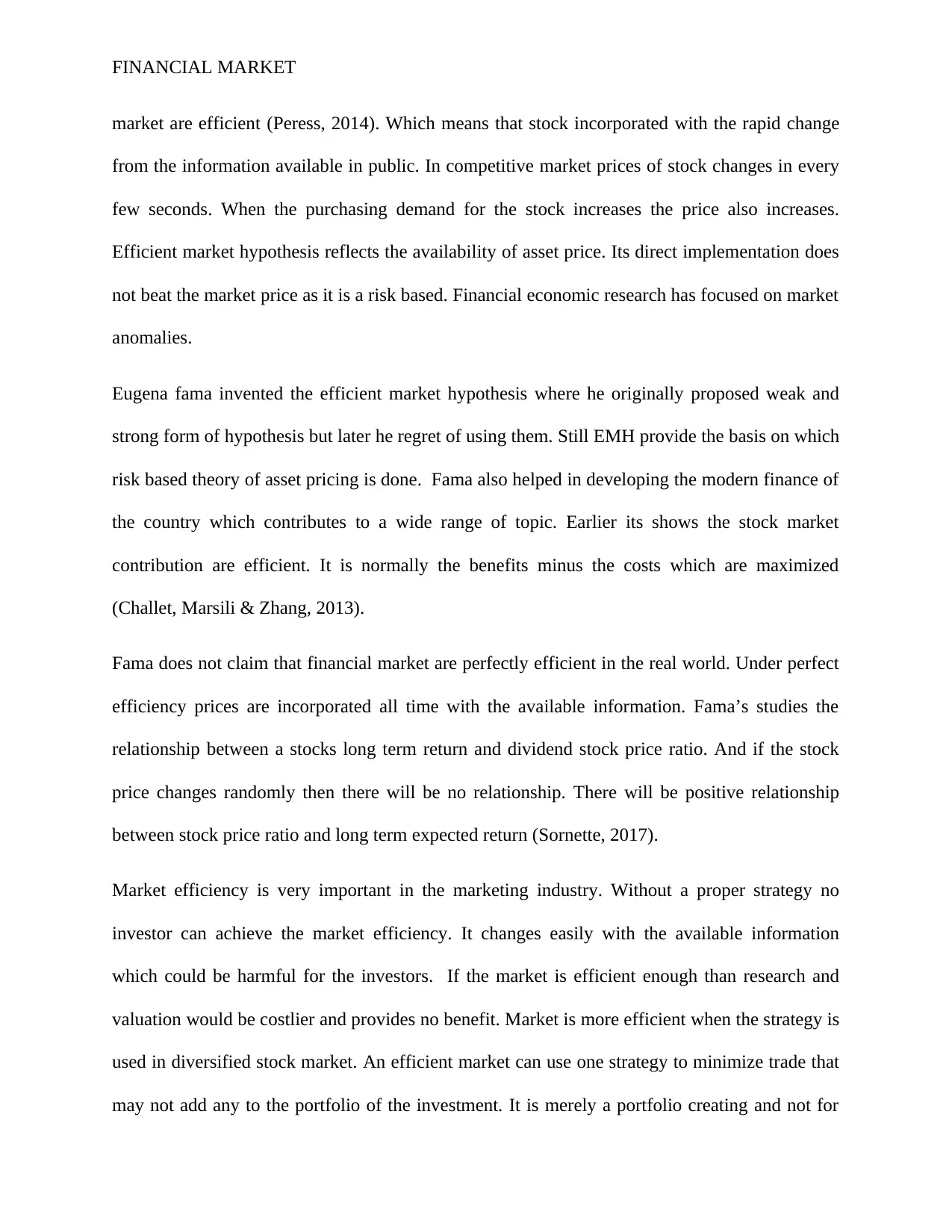
FINANCIAL MARKET
market are efficient (Peress, 2014). Which means that stock incorporated with the rapid change
from the information available in public. In competitive market prices of stock changes in every
few seconds. When the purchasing demand for the stock increases the price also increases.
Efficient market hypothesis reflects the availability of asset price. Its direct implementation does
not beat the market price as it is a risk based. Financial economic research has focused on market
anomalies.
Eugena fama invented the efficient market hypothesis where he originally proposed weak and
strong form of hypothesis but later he regret of using them. Still EMH provide the basis on which
risk based theory of asset pricing is done. Fama also helped in developing the modern finance of
the country which contributes to a wide range of topic. Earlier its shows the stock market
contribution are efficient. It is normally the benefits minus the costs which are maximized
(Challet, Marsili & Zhang, 2013).
Fama does not claim that financial market are perfectly efficient in the real world. Under perfect
efficiency prices are incorporated all time with the available information. Fama’s studies the
relationship between a stocks long term return and dividend stock price ratio. And if the stock
price changes randomly then there will be no relationship. There will be positive relationship
between stock price ratio and long term expected return (Sornette, 2017).
Market efficiency is very important in the marketing industry. Without a proper strategy no
investor can achieve the market efficiency. It changes easily with the available information
which could be harmful for the investors. If the market is efficient enough than research and
valuation would be costlier and provides no benefit. Market is more efficient when the strategy is
used in diversified stock market. An efficient market can use one strategy to minimize trade that
may not add any to the portfolio of the investment. It is merely a portfolio creating and not for
market are efficient (Peress, 2014). Which means that stock incorporated with the rapid change
from the information available in public. In competitive market prices of stock changes in every
few seconds. When the purchasing demand for the stock increases the price also increases.
Efficient market hypothesis reflects the availability of asset price. Its direct implementation does
not beat the market price as it is a risk based. Financial economic research has focused on market
anomalies.
Eugena fama invented the efficient market hypothesis where he originally proposed weak and
strong form of hypothesis but later he regret of using them. Still EMH provide the basis on which
risk based theory of asset pricing is done. Fama also helped in developing the modern finance of
the country which contributes to a wide range of topic. Earlier its shows the stock market
contribution are efficient. It is normally the benefits minus the costs which are maximized
(Challet, Marsili & Zhang, 2013).
Fama does not claim that financial market are perfectly efficient in the real world. Under perfect
efficiency prices are incorporated all time with the available information. Fama’s studies the
relationship between a stocks long term return and dividend stock price ratio. And if the stock
price changes randomly then there will be no relationship. There will be positive relationship
between stock price ratio and long term expected return (Sornette, 2017).
Market efficiency is very important in the marketing industry. Without a proper strategy no
investor can achieve the market efficiency. It changes easily with the available information
which could be harmful for the investors. If the market is efficient enough than research and
valuation would be costlier and provides no benefit. Market is more efficient when the strategy is
used in diversified stock market. An efficient market can use one strategy to minimize trade that
may not add any to the portfolio of the investment. It is merely a portfolio creating and not for
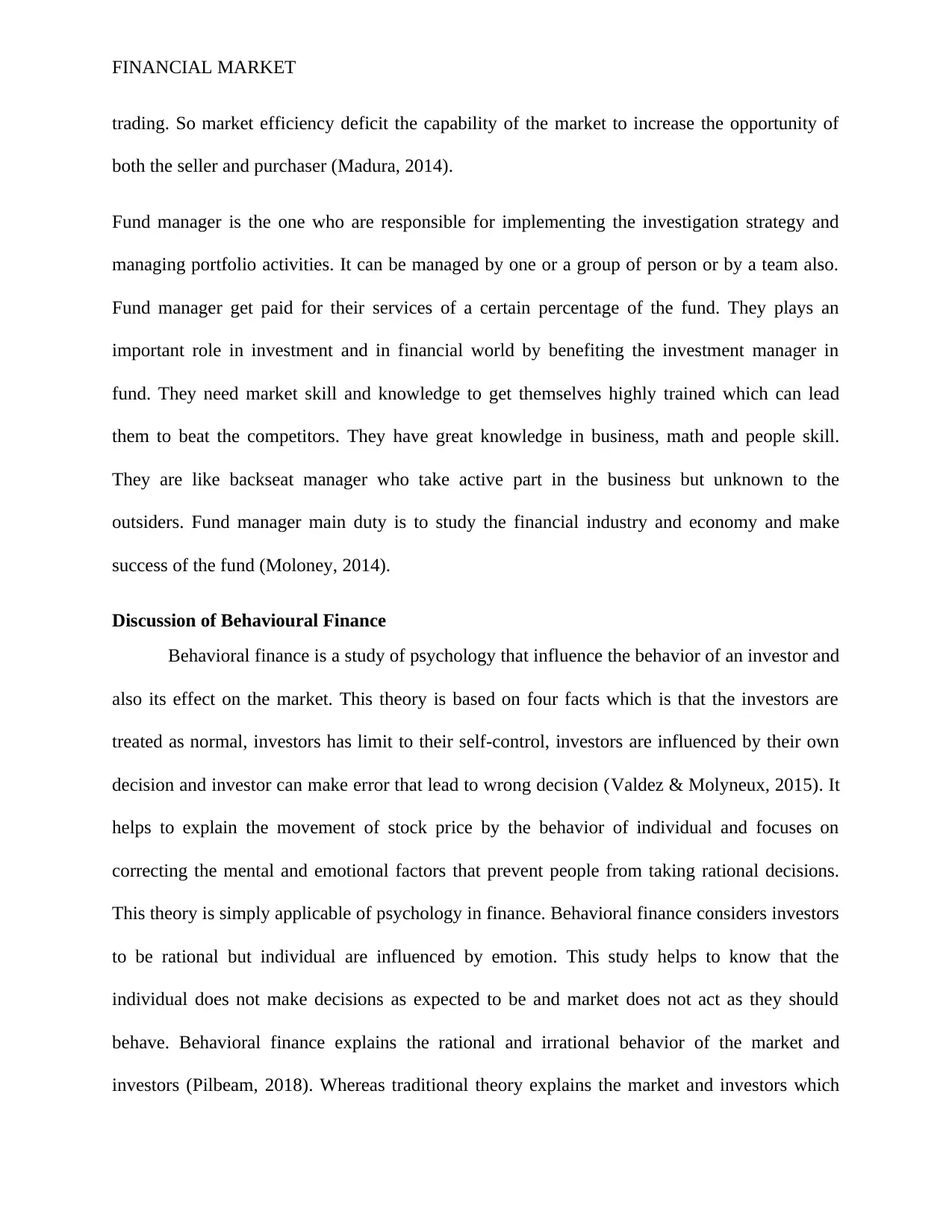
FINANCIAL MARKET
trading. So market efficiency deficit the capability of the market to increase the opportunity of
both the seller and purchaser (Madura, 2014).
Fund manager is the one who are responsible for implementing the investigation strategy and
managing portfolio activities. It can be managed by one or a group of person or by a team also.
Fund manager get paid for their services of a certain percentage of the fund. They plays an
important role in investment and in financial world by benefiting the investment manager in
fund. They need market skill and knowledge to get themselves highly trained which can lead
them to beat the competitors. They have great knowledge in business, math and people skill.
They are like backseat manager who take active part in the business but unknown to the
outsiders. Fund manager main duty is to study the financial industry and economy and make
success of the fund (Moloney, 2014).
Discussion of Behavioural Finance
Behavioral finance is a study of psychology that influence the behavior of an investor and
also its effect on the market. This theory is based on four facts which is that the investors are
treated as normal, investors has limit to their self-control, investors are influenced by their own
decision and investor can make error that lead to wrong decision (Valdez & Molyneux, 2015). It
helps to explain the movement of stock price by the behavior of individual and focuses on
correcting the mental and emotional factors that prevent people from taking rational decisions.
This theory is simply applicable of psychology in finance. Behavioral finance considers investors
to be rational but individual are influenced by emotion. This study helps to know that the
individual does not make decisions as expected to be and market does not act as they should
behave. Behavioral finance explains the rational and irrational behavior of the market and
investors (Pilbeam, 2018). Whereas traditional theory explains the market and investors which
trading. So market efficiency deficit the capability of the market to increase the opportunity of
both the seller and purchaser (Madura, 2014).
Fund manager is the one who are responsible for implementing the investigation strategy and
managing portfolio activities. It can be managed by one or a group of person or by a team also.
Fund manager get paid for their services of a certain percentage of the fund. They plays an
important role in investment and in financial world by benefiting the investment manager in
fund. They need market skill and knowledge to get themselves highly trained which can lead
them to beat the competitors. They have great knowledge in business, math and people skill.
They are like backseat manager who take active part in the business but unknown to the
outsiders. Fund manager main duty is to study the financial industry and economy and make
success of the fund (Moloney, 2014).
Discussion of Behavioural Finance
Behavioral finance is a study of psychology that influence the behavior of an investor and
also its effect on the market. This theory is based on four facts which is that the investors are
treated as normal, investors has limit to their self-control, investors are influenced by their own
decision and investor can make error that lead to wrong decision (Valdez & Molyneux, 2015). It
helps to explain the movement of stock price by the behavior of individual and focuses on
correcting the mental and emotional factors that prevent people from taking rational decisions.
This theory is simply applicable of psychology in finance. Behavioral finance considers investors
to be rational but individual are influenced by emotion. This study helps to know that the
individual does not make decisions as expected to be and market does not act as they should
behave. Behavioral finance explains the rational and irrational behavior of the market and
investors (Pilbeam, 2018). Whereas traditional theory explains the market and investors which
⊘ This is a preview!⊘
Do you want full access?
Subscribe today to unlock all pages.

Trusted by 1+ million students worldwide
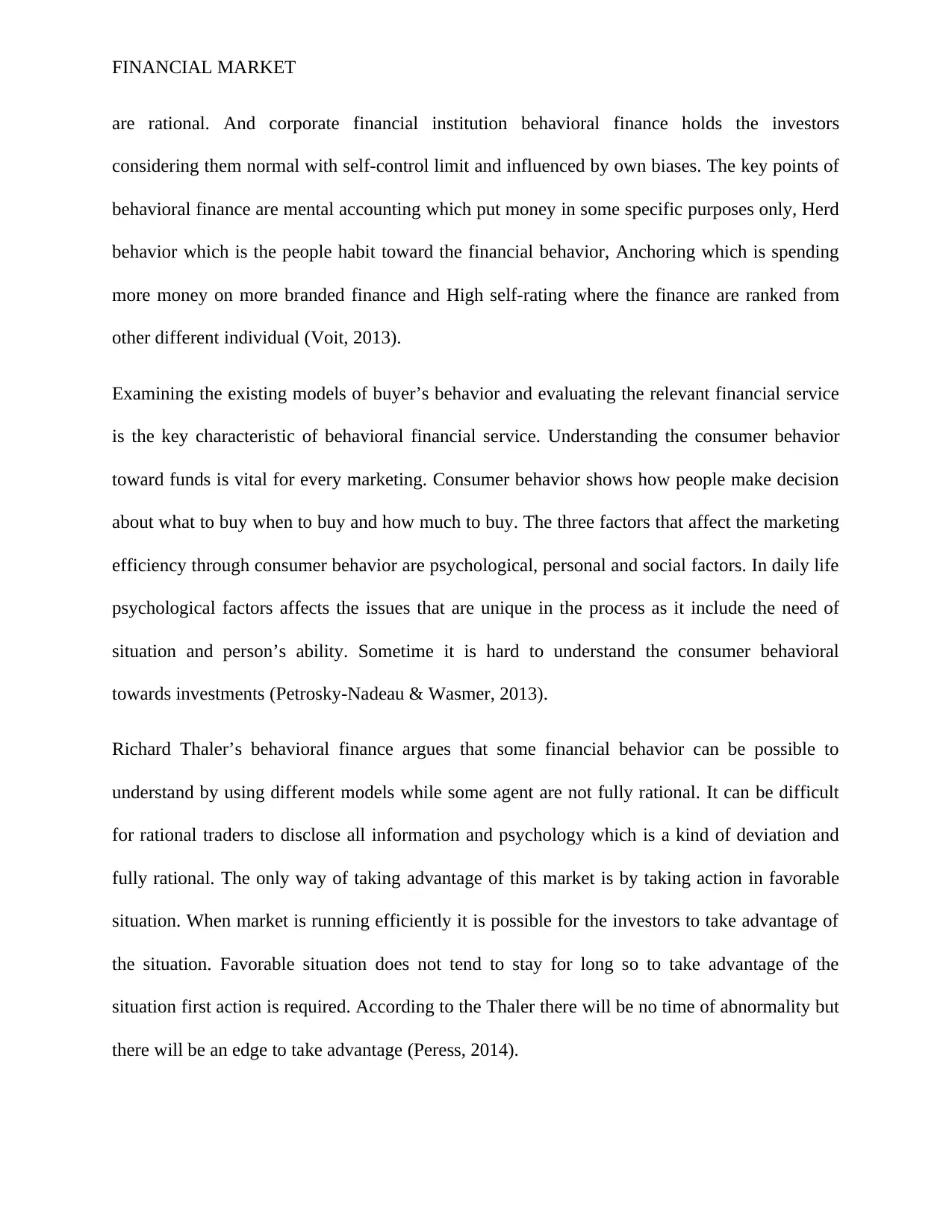
FINANCIAL MARKET
are rational. And corporate financial institution behavioral finance holds the investors
considering them normal with self-control limit and influenced by own biases. The key points of
behavioral finance are mental accounting which put money in some specific purposes only, Herd
behavior which is the people habit toward the financial behavior, Anchoring which is spending
more money on more branded finance and High self-rating where the finance are ranked from
other different individual (Voit, 2013).
Examining the existing models of buyer’s behavior and evaluating the relevant financial service
is the key characteristic of behavioral financial service. Understanding the consumer behavior
toward funds is vital for every marketing. Consumer behavior shows how people make decision
about what to buy when to buy and how much to buy. The three factors that affect the marketing
efficiency through consumer behavior are psychological, personal and social factors. In daily life
psychological factors affects the issues that are unique in the process as it include the need of
situation and person’s ability. Sometime it is hard to understand the consumer behavioral
towards investments (Petrosky-Nadeau & Wasmer, 2013).
Richard Thaler’s behavioral finance argues that some financial behavior can be possible to
understand by using different models while some agent are not fully rational. It can be difficult
for rational traders to disclose all information and psychology which is a kind of deviation and
fully rational. The only way of taking advantage of this market is by taking action in favorable
situation. When market is running efficiently it is possible for the investors to take advantage of
the situation. Favorable situation does not tend to stay for long so to take advantage of the
situation first action is required. According to the Thaler there will be no time of abnormality but
there will be an edge to take advantage (Peress, 2014).
are rational. And corporate financial institution behavioral finance holds the investors
considering them normal with self-control limit and influenced by own biases. The key points of
behavioral finance are mental accounting which put money in some specific purposes only, Herd
behavior which is the people habit toward the financial behavior, Anchoring which is spending
more money on more branded finance and High self-rating where the finance are ranked from
other different individual (Voit, 2013).
Examining the existing models of buyer’s behavior and evaluating the relevant financial service
is the key characteristic of behavioral financial service. Understanding the consumer behavior
toward funds is vital for every marketing. Consumer behavior shows how people make decision
about what to buy when to buy and how much to buy. The three factors that affect the marketing
efficiency through consumer behavior are psychological, personal and social factors. In daily life
psychological factors affects the issues that are unique in the process as it include the need of
situation and person’s ability. Sometime it is hard to understand the consumer behavioral
towards investments (Petrosky-Nadeau & Wasmer, 2013).
Richard Thaler’s behavioral finance argues that some financial behavior can be possible to
understand by using different models while some agent are not fully rational. It can be difficult
for rational traders to disclose all information and psychology which is a kind of deviation and
fully rational. The only way of taking advantage of this market is by taking action in favorable
situation. When market is running efficiently it is possible for the investors to take advantage of
the situation. Favorable situation does not tend to stay for long so to take advantage of the
situation first action is required. According to the Thaler there will be no time of abnormality but
there will be an edge to take advantage (Peress, 2014).
Paraphrase This Document
Need a fresh take? Get an instant paraphrase of this document with our AI Paraphraser
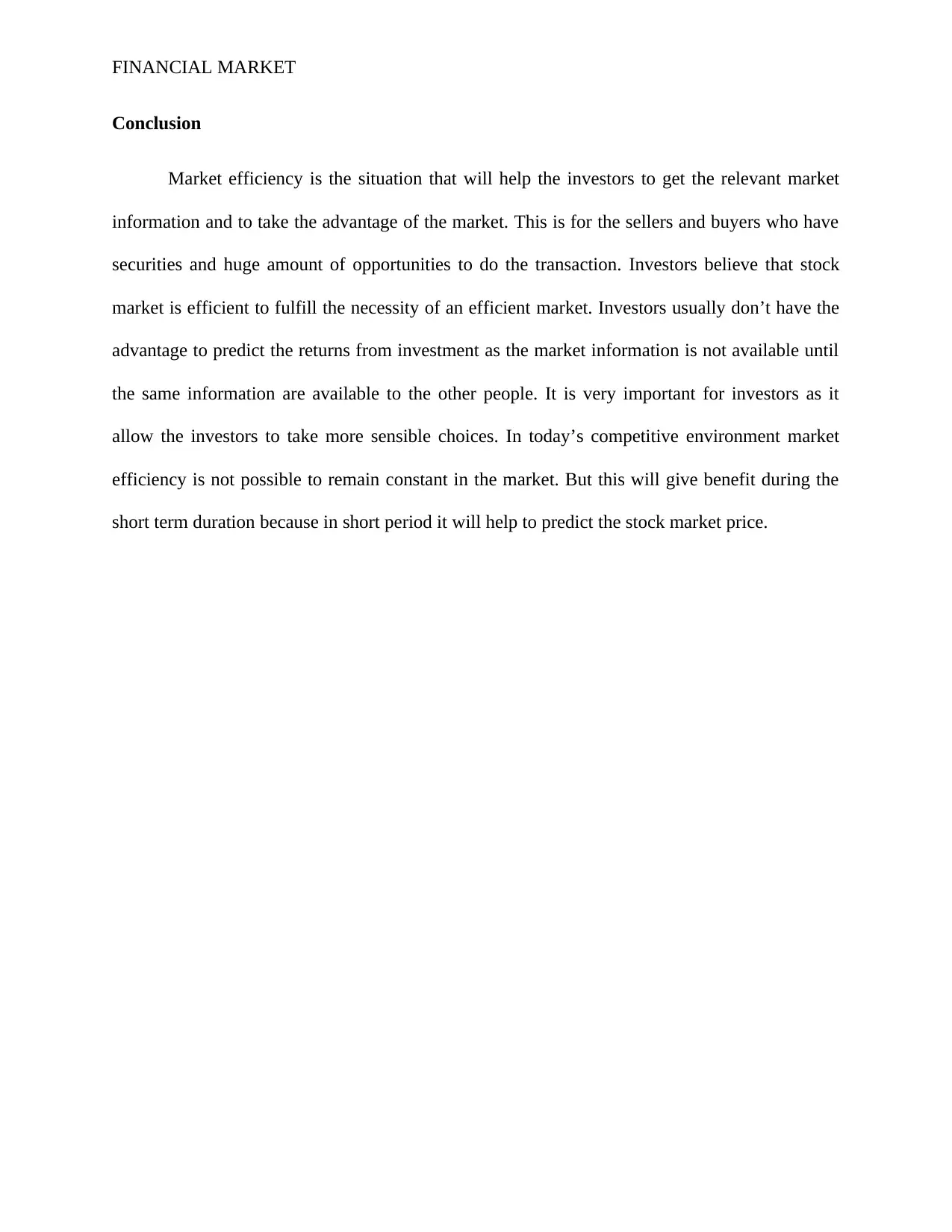
FINANCIAL MARKET
Conclusion
Market efficiency is the situation that will help the investors to get the relevant market
information and to take the advantage of the market. This is for the sellers and buyers who have
securities and huge amount of opportunities to do the transaction. Investors believe that stock
market is efficient to fulfill the necessity of an efficient market. Investors usually don’t have the
advantage to predict the returns from investment as the market information is not available until
the same information are available to the other people. It is very important for investors as it
allow the investors to take more sensible choices. In today’s competitive environment market
efficiency is not possible to remain constant in the market. But this will give benefit during the
short term duration because in short period it will help to predict the stock market price.
Conclusion
Market efficiency is the situation that will help the investors to get the relevant market
information and to take the advantage of the market. This is for the sellers and buyers who have
securities and huge amount of opportunities to do the transaction. Investors believe that stock
market is efficient to fulfill the necessity of an efficient market. Investors usually don’t have the
advantage to predict the returns from investment as the market information is not available until
the same information are available to the other people. It is very important for investors as it
allow the investors to take more sensible choices. In today’s competitive environment market
efficiency is not possible to remain constant in the market. But this will give benefit during the
short term duration because in short period it will help to predict the stock market price.
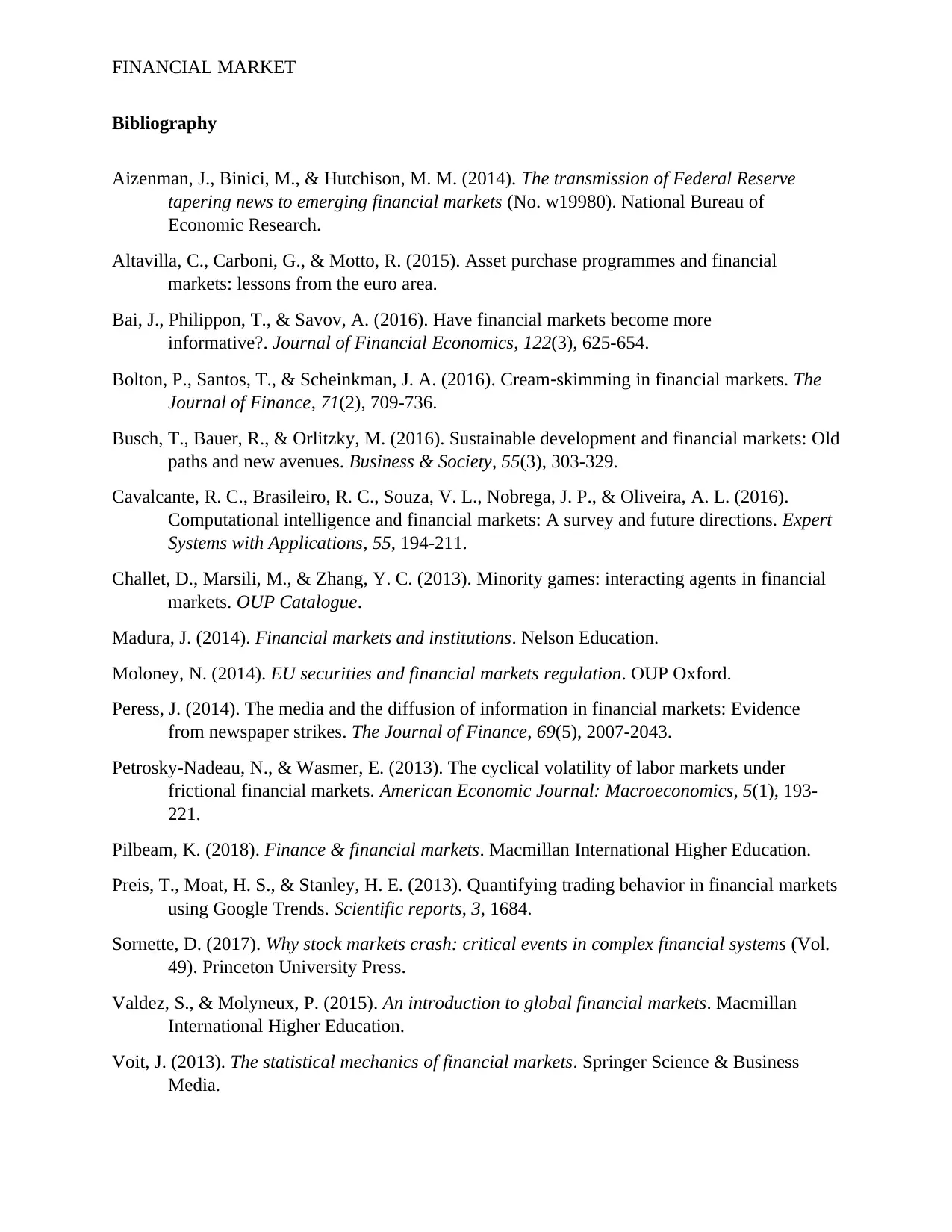
FINANCIAL MARKET
Bibliography
Aizenman, J., Binici, M., & Hutchison, M. M. (2014). The transmission of Federal Reserve
tapering news to emerging financial markets (No. w19980). National Bureau of
Economic Research.
Altavilla, C., Carboni, G., & Motto, R. (2015). Asset purchase programmes and financial
markets: lessons from the euro area.
Bai, J., Philippon, T., & Savov, A. (2016). Have financial markets become more
informative?. Journal of Financial Economics, 122(3), 625-654.
Bolton, P., Santos, T., & Scheinkman, J. A. (2016). Cream‐skimming in financial markets. The
Journal of Finance, 71(2), 709-736.
Busch, T., Bauer, R., & Orlitzky, M. (2016). Sustainable development and financial markets: Old
paths and new avenues. Business & Society, 55(3), 303-329.
Cavalcante, R. C., Brasileiro, R. C., Souza, V. L., Nobrega, J. P., & Oliveira, A. L. (2016).
Computational intelligence and financial markets: A survey and future directions. Expert
Systems with Applications, 55, 194-211.
Challet, D., Marsili, M., & Zhang, Y. C. (2013). Minority games: interacting agents in financial
markets. OUP Catalogue.
Madura, J. (2014). Financial markets and institutions. Nelson Education.
Moloney, N. (2014). EU securities and financial markets regulation. OUP Oxford.
Peress, J. (2014). The media and the diffusion of information in financial markets: Evidence
from newspaper strikes. The Journal of Finance, 69(5), 2007-2043.
Petrosky-Nadeau, N., & Wasmer, E. (2013). The cyclical volatility of labor markets under
frictional financial markets. American Economic Journal: Macroeconomics, 5(1), 193-
221.
Pilbeam, K. (2018). Finance & financial markets. Macmillan International Higher Education.
Preis, T., Moat, H. S., & Stanley, H. E. (2013). Quantifying trading behavior in financial markets
using Google Trends. Scientific reports, 3, 1684.
Sornette, D. (2017). Why stock markets crash: critical events in complex financial systems (Vol.
49). Princeton University Press.
Valdez, S., & Molyneux, P. (2015). An introduction to global financial markets. Macmillan
International Higher Education.
Voit, J. (2013). The statistical mechanics of financial markets. Springer Science & Business
Media.
Bibliography
Aizenman, J., Binici, M., & Hutchison, M. M. (2014). The transmission of Federal Reserve
tapering news to emerging financial markets (No. w19980). National Bureau of
Economic Research.
Altavilla, C., Carboni, G., & Motto, R. (2015). Asset purchase programmes and financial
markets: lessons from the euro area.
Bai, J., Philippon, T., & Savov, A. (2016). Have financial markets become more
informative?. Journal of Financial Economics, 122(3), 625-654.
Bolton, P., Santos, T., & Scheinkman, J. A. (2016). Cream‐skimming in financial markets. The
Journal of Finance, 71(2), 709-736.
Busch, T., Bauer, R., & Orlitzky, M. (2016). Sustainable development and financial markets: Old
paths and new avenues. Business & Society, 55(3), 303-329.
Cavalcante, R. C., Brasileiro, R. C., Souza, V. L., Nobrega, J. P., & Oliveira, A. L. (2016).
Computational intelligence and financial markets: A survey and future directions. Expert
Systems with Applications, 55, 194-211.
Challet, D., Marsili, M., & Zhang, Y. C. (2013). Minority games: interacting agents in financial
markets. OUP Catalogue.
Madura, J. (2014). Financial markets and institutions. Nelson Education.
Moloney, N. (2014). EU securities and financial markets regulation. OUP Oxford.
Peress, J. (2014). The media and the diffusion of information in financial markets: Evidence
from newspaper strikes. The Journal of Finance, 69(5), 2007-2043.
Petrosky-Nadeau, N., & Wasmer, E. (2013). The cyclical volatility of labor markets under
frictional financial markets. American Economic Journal: Macroeconomics, 5(1), 193-
221.
Pilbeam, K. (2018). Finance & financial markets. Macmillan International Higher Education.
Preis, T., Moat, H. S., & Stanley, H. E. (2013). Quantifying trading behavior in financial markets
using Google Trends. Scientific reports, 3, 1684.
Sornette, D. (2017). Why stock markets crash: critical events in complex financial systems (Vol.
49). Princeton University Press.
Valdez, S., & Molyneux, P. (2015). An introduction to global financial markets. Macmillan
International Higher Education.
Voit, J. (2013). The statistical mechanics of financial markets. Springer Science & Business
Media.
⊘ This is a preview!⊘
Do you want full access?
Subscribe today to unlock all pages.

Trusted by 1+ million students worldwide
1 out of 9
Related Documents
Your All-in-One AI-Powered Toolkit for Academic Success.
+13062052269
info@desklib.com
Available 24*7 on WhatsApp / Email
![[object Object]](/_next/static/media/star-bottom.7253800d.svg)
Unlock your academic potential
Copyright © 2020–2026 A2Z Services. All Rights Reserved. Developed and managed by ZUCOL.





